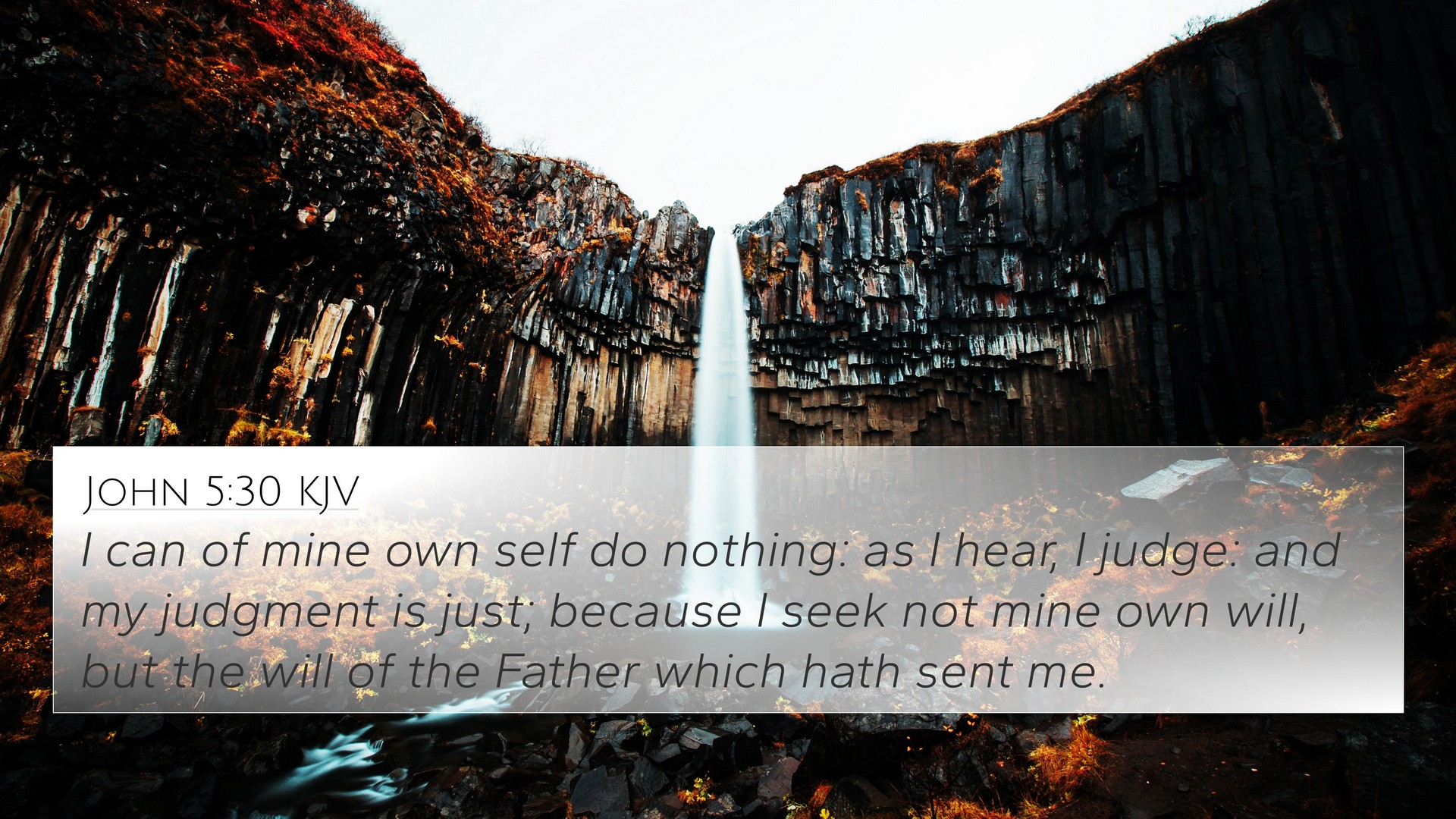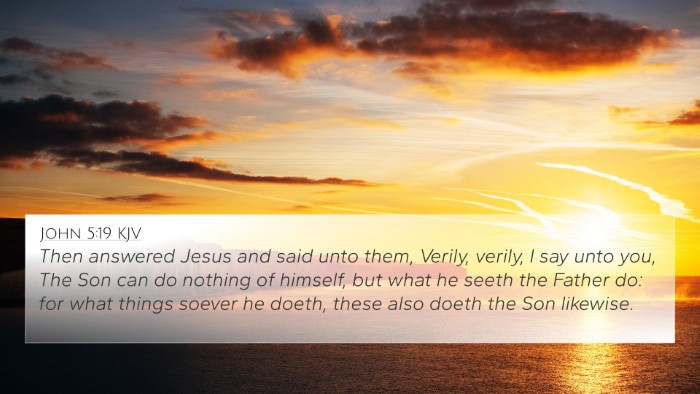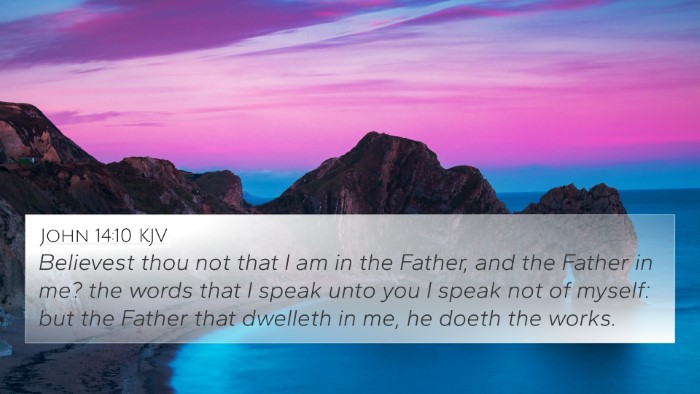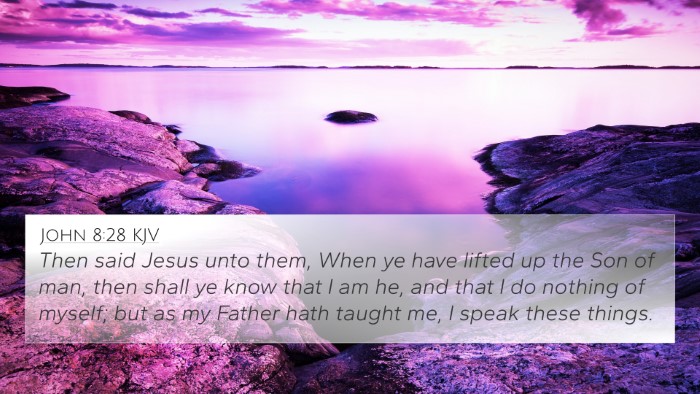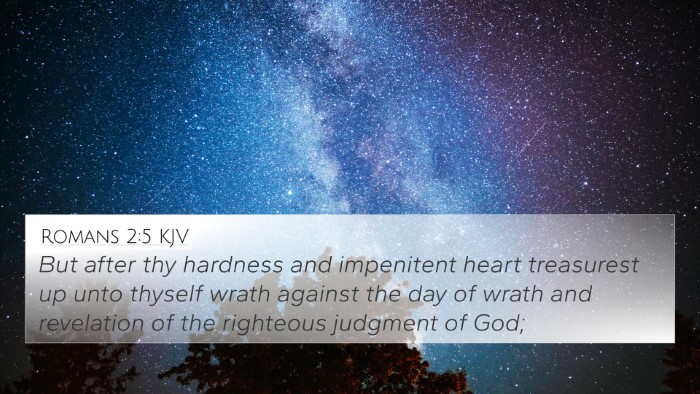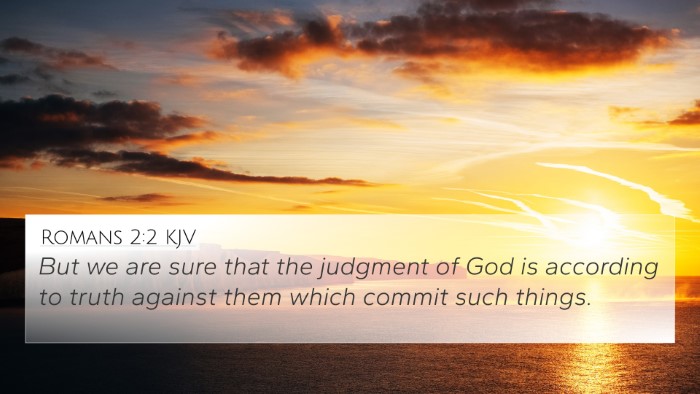Understanding John 5:30
Verse: "I can of mine own self do nothing: as I hear, I judge: and my judgment is just; because I seek not mine own will, but the will of the Father which hath sent me." (John 5:30)
In John 5:30, Jesus articulates His complete dependence on the Father, showcasing His divine mission. This verse serves as a profound statement about the nature of Christ's authority and judgment, emphasizing His role in divine will as opposed to personal ambition.
Key Themes and Insights
- Divine Dependency: Jesus expresses that His ability to act and judge is not self-derived, reflecting His submission to the Father's authority.
- Just Judgment: The nature of His judgment is described as just, stemming from His perfect understanding of God's will.
- Mission and Purpose: The phrase "the will of the Father" underscores that Christ's mission is to fulfill what God intends for humanity.
Commentary Insights
Matthew Henry notes that this verse teaches us the necessity of divine guidance in making judgments, highlighting that Christ, in His humanity, lived by the direction of the Father while on Earth.
Albert Barnes elaborates that the emphasis on hearing to judge points to the intimate connection between divine communication and the subsequent actions. It reflects that spiritual discernment requires an attentive ear to God’s voice.
Adam Clarke emphasizes that this assertion of dependence reveals not only Jesus’ humility but also sets a model for believers in recognizing their need for God's guidance in all matters.
Comparative Analysis with Other Scriptures
This verse can be enriched through comparative Bible verse analysis. Here are some related passages that provide deeper understanding:
- John 8:28: "When you have lifted up the Son of Man, then you will know that I am he and that I do nothing on my own but speak just what the Father has taught me."
- Philippians 2:7-8: "But made himself of no reputation, and took upon him the form of a servant, and was made in the likeness of men: And being found in fashion as a man, he humbled himself, and became obedient unto death, even the death of the cross."
- Matthew 26:39: "And he went a little farther, and fell on his face, and prayed, saying, O my Father, if it be possible, let this cup pass from me: nevertheless not as I will, but as thou wilt."
- John 12:49: "For I have not spoken of myself; but the Father which sent me, he gave me a commandment, what I should say, and what I should speak."
- Luke 22:42: "Saying, Father, if thou be willing, remove this cup from me: nevertheless not my will, but thine, be done."
- John 14:10: "Believest thou not that I am in the Father, and the Father in me? The words that I speak unto you I speak not of myself: but the Father that dwelleth in me, he doeth the works."
- Romans 15:3: "For even Christ pleased not himself; but, as it is written, The reproaches of them that reproached thee fell on me."
Exploring Thematic Connections
This verse also invites thematic connections across the biblical narrative. The nature of Christ’s submission can be juxtaposed with the themes of obedience found throughout both the Old and New Testaments.
For example, the prophets often expressed a similar sentiment of seeking the will of God above their own desires. This connects to verses in Isaiah 55:8-9, which remind us that God's thoughts and ways are higher than our own, urging believers to align themselves with divine purpose.
Practical Application in Bible Study
When studying Bible verses, utilizing a Bible cross-reference guide can enhance understanding, helping readers identify connections between scriptures that reinforce or illuminate a particular passage. Here are some tools that can aid in this process:
- Use a Bible concordance to find thematic relationships.
- Employ cross-reference Bible study methods to uncover related verses.
- Consult a Bible reference resource to deepen your knowledge of cross-referenced themes.
- Incorporate Bible chain references to establish a comprehensive view of interconnected scripture.
Inter-Biblical Dialogue
John 5:30 prompts significant inter-Biblical dialogue between the teachings of Christ and those of the Old Testament. This verse stands as an invitation to engage in a deeper study of how Christ fulfills and completes the law and the examples found in the life of righteous figures like Moses and David.
Conclusion
Ultimately, John 5:30 serves as a powerful reminder of the necessity of aligning our actions and judgments with God's will. Through the insights gained from public domain commentaries and the connections made with other scriptures, believers can deepen their understanding and obedience to the divine calling.
Keywords for Further Study
For those exploring cross-referencing Biblical texts and desire to delve deeper, consider utilizing the following keywords for your studies:
- Bible verses that relate to each other
- How to find cross-references in the Bible
- Identifying connections between Old and New Testament
- Cross-referenced themes in the Bible
